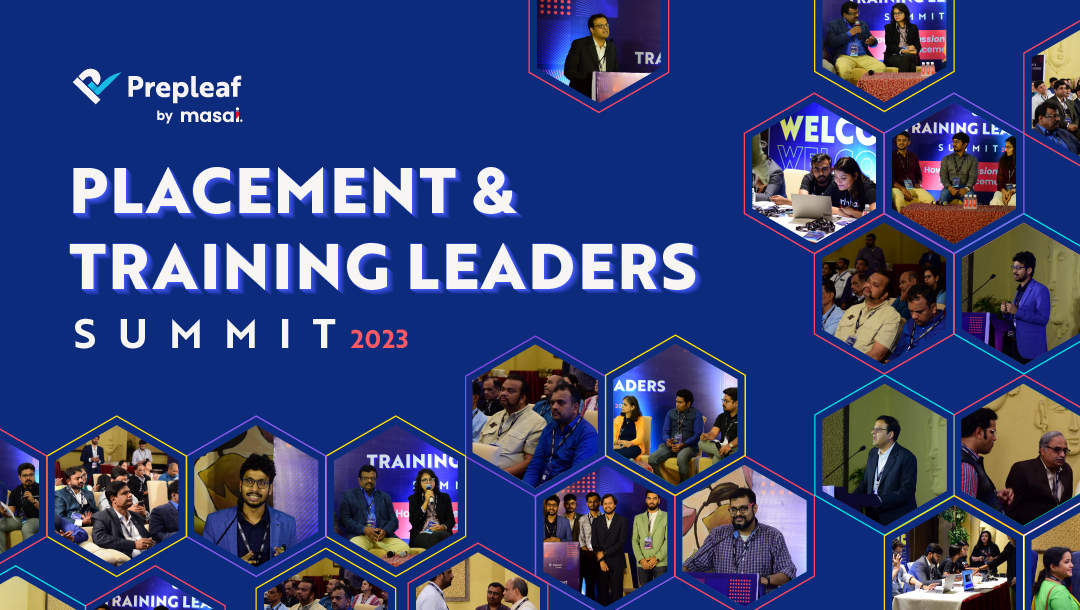How To Recession-Proof Placements
Placement officers from top engineering colleges and recruiters from the tech industry were brought together by Prepleaf by Masai to discuss how to navigate this economic slowdown.

The tech industry has been in flux since 2022. Not only are tech companies of all sizes facing financial challenges, engineering students and tech professionals are facing employability challenges. According to a very recent report, the employability rate of Indian graduates applying for jobs is a mere 45%. Out of the 15 lakh engineering graduates that enter the market every year, only 3% get high-quality tech jobs in India. This has become a bigger obstacle in the ongoing recession-like environment.
So, how does an educational institution with hundreds if not thousands of bright young students ensure that their placement processes are recession-proof, safeguarding their students’ futures?
This was the question of the evening at the Placement and Training Leaders Summit 2023 hosted by Prepleaf by Masai on 4 August. The event saw the attendance of over 50 Placement Officers from higher education institutions across Bengaluru as well as talent acquisition heads from top companies such as Wildcraft and Cradlewise.
The evening started with an opening note by SVP and Co-founder of Masai, Yogesh Bhat, where he spoke about the mission and vision of Prepleaf by Masai, why it’s an important platform to bridge the skill gap in India and how exactly Prepleaf does it. “One of the biggest challenges with hiring freshers today, according to companies, is in aptitude. They know how to solve a problem but don’t know how to apply a problem,” said Yogesh, outlining the need for bringing together two of the most vital players in the tech hiring landscape during a recession-like phase – Placement Officers and Talent Acquisition professionals.
After the scene was expertly set by Yogesh, the panel discussion featuring Honey Pamnani, DGM Public Policy & Strategy at National Skill Development Corporation, Ashish Banka, HR Leader - Talent & Culture at Cradlewise, Mitcch Duddani, Head Recruitment at Wildcraft India, Mohan Arun Das S, Head of Placement at Sri Venkateswara College of Engineering, and Dr. Ranganath Doreswami, Dean of Placement & Training at RV College Of Engineering commenced. Moderated by Senior Director of Marketing and Community at Masai, Dipankar Paul, the panel’s main focus was discussing how to navigate hiring and placements in a recession.
The discussion was kickstarted with discussing how the tech placement and hiring space has suffered in the past year due to the economic slowdown that has not only led to hiring freezes but also mass layoffs across the board and how we, as a community, can deal with this slump. Dr. Ranganath and Honey agreed on the point that while the economic slowdown has affected hiring with many companies becoming cautious with spending, it by no means is a permanent situation that needs to be addressed with an overhaul. “Factors like recession are short-lived, so students can see it as an opportunity to upskill and improve themselves. It’s not that there’s a dearth of opportunities, nationally and internationally as well, especially for Indian engineers,” said Honey.
Mitcch, too, spoke about the hiring trends from the recruiter’s perspective, saying there's been a shift in perspective over the past few years. “Pre-pandemic companies would go and hire in bulk from campuses but now, irrespective of the economic climate, companies are being very deliberate in their hiring processes. They ask why they’re hiring someone, for what function, how much will it cost and most importantly – what’s the X factor? What are you bringing to the table of the company?” she said.
The panel dove further into defining what the actual gap is in the tech hiring space. According to Ashish, there are four major kinds of gaps: A skill gap, wherein some students with access to better resources are better skilled; a behavioural gap, where soft skills are lacking; the third gap is the entrepreneurial mindset gap, wherein a student’s determination and willingness to adapt is not there; and the fourth gap is a mindset gap, where many students fail to rethink their situation. If the traditional way isn’t working out, are they asking themselves, what else can I do?
Coming to possible solutions, Ashish again outlined his idea in two points – build strong mentorship programmes for students and work on developing an entrepreneurial mindset. Honey, too, chimed in and stated that there is much demand for Indian engineering professionals in the world but we need to switch our perspective to truly mine these opportunities. Mohan Arun Das and Dr. Ranganath spoke about how students can learn in different ways to help them with holistic skills such as guest lecturers, bootcamps, and internships. These also need to be industry-oriented to ensure that the students match up to industry requirements.
The panel discussion ended with all the speakers reiterating the need for a paradigm shift in order to cope with a constantly changing landscape.
Prepleaf co-founder and CEO Ankit Agrawal then took the stage and spoke about how Prepleaf aims to bring in the next generation of tech professionals, equipped with skills of the future, by partnering with colleges and universities across India to help make a truly skilled workforce.
The event ended with the audience meeting Masai alumni, who spoke about their enriching experiences and how they became full-fledged tech professionals thanks to the holistic program.

